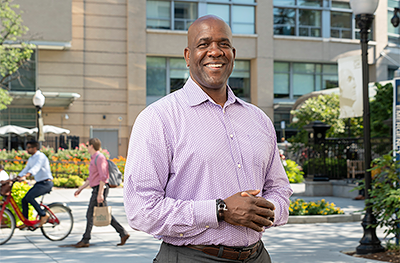Assistant professor. Researcher. Author. These are just some of Robert Turner’s current roles. But that wasn’t always the case. He once viewed himself as only one thing: a professional football player. “I adopted that role, and it shaped … how I saw myself and how others saw me,” says Robert Turner, PhD, assistant professor of clinical research and leadership at the George Washington University (GW) School of Medicine and Health Sciences (SMHS).
One day, however, that identity evaporated. Turner was in his late 20s when the general manager of the San Francisco 49ers called him into his office and told him he had been cut from the team. His professional sports career was over. The GM followed the news with a question, “Where do you want to go now?”

Turner didn’t have an answer. “Every part of my life was planned out to continue doing what I was doing. All of a sudden, in one moment, the ceiling came crashing down,” he says. There was one thing Turner did know, if not in that exact moment: the importance of advancing his education. He decided to study sociology, and he earned his PhD from the Graduate Center, City University of New York, in 2010. Today, Turner sits in his office at 2100 Pennsylvania Ave., the recipient of a prestigious National Institutes of Health (NIH) K01 grant, and confident in his new direction. It’s his experiences as an athlete, Turner says, that fuel his work at SMHS. The key goal of his grant, from the NIH’s National Institute on Aging, is to better understand the neurocognitive and psychosocial risks presented to individuals who have experienced traumatic brain injury, compared with those who have not. He is measuring athletes’ cognitive function and how it may change over time, and coupling those data with their personal attitudes and beliefs about health and mental health. Turner says he also hopes to replicate the study with veterans to see if the pathology of brain injuries is different in that population compared with athletes, as well as to better understand how people’s social networks affect their attitudes toward medicine and mental health. When Turner was 28, he suddenly faced an unclear future for the first time. But today, he has his sights set on new opportunities. He published his first book, “Not for Long: The Life and Career of the NFL Athlete.” He is building his own research team at GW. And he’s helping athletes navigate a world that doesn’t always have a place for them once the final whistle blows.



